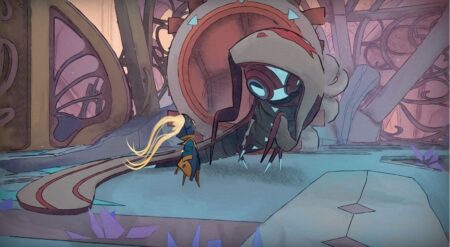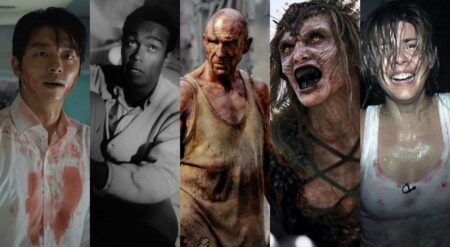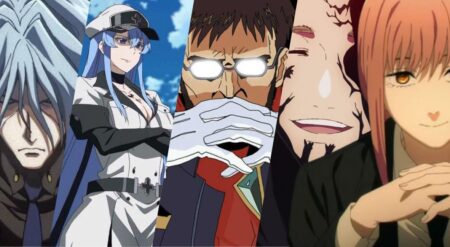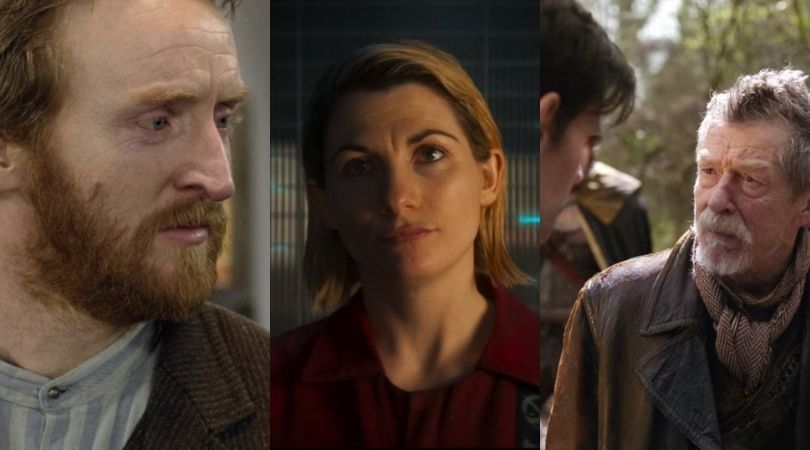
Doctor Who is a BBC science fiction series created in 1963 by Sydney Newman. The series follows the Doctor, an ancient alien who travels the universe battling evil, saving lives, and traversing time and space. After being canceled in 1989, bar a TV movie in 1996, the show was resurrected in 2005 by Russell T. Davies. Since 2005, there have been six different actors playing the role, resulting in plenty of Doctor Who episodes to choose from.
The Doctor has been played by multiple actors, mainly due to the show’s lengthy existence and the Doctor’s ability to regenerate. When mortally injured, the Doctor can revive themselves, completely changing in the process. Everything about them is altered, becoming a different person, complete with a brand new appearance and personality. As such, each regeneration has been a new actor.
This list proposes an episode starring each Doctor since the 2005 revival that someone new to the series could jump into and enjoy. These suggestions are based on the script, the characters, and how well the episode encapsulates the show in general and the doctor’s iteration. They may not be the best episode, but they are a fantastic representative of the show. Doctor Who is a melting pot of genres, including horror, comedy, and drama leading to episodes that will make you laugh, cry, or hide behind the sofa, most of the time a mixture of all three. Without further ado, here are six Doctor Who episodes everyone must watch.
Ninth Doctor (Christopher Ecclestone): Father’s Day

Written by Paul Cornell and directed by Joe Ahearne
Not interfering with your own timeline is one of the Doctor’s golden rules. Rose Tyler asks to travel to November 7th, 1987, the day her father died. As a speeding car rushes towards Pete Tyler, his daughter grabs him and throws him to the floor, keeping him alive past the point at which he was supposed to die. Rose and the Doctor travel with Pete to a wedding, but Rose’s alteration of time has unleashed The Reapers. The protagonists are now trapped inside a church as Rose’s actions endanger not just her family but the entire world…
A question is posed: how important is it if an ordinary man escapes death? As it turns out, it’s the most important thing in the universe. This episode is fantastic because it explains the rules of time within the series and what is at risk when you decide to disrupt it. There are fixed points in history, and disrupting that has endless ramifications.
The plot is terrifying in its execution, leaving the audience constantly on edge. As victims start being picked off and the church doors are slammed shut, there is a permanent sense of unease and claustrophobia.
Christopher Eccleston displays his incarnation’s unique fury. Angry and often cruel, this was a Doctor still scarred by war, unashamed of who he hurts with his savage words. But he also is still devoted to the preservation of life. His companion, Rose, shows just how human she is when granted the freedom of time and space to travel. And Shaun Dingwall as Pete Tyler proves a tragic performance as Rose learns more about the man she never truly knew.
“Father’s Day” is intimate, heartbreaking, and scary, personalizing time travel in a way only Doctor Who does best.
If you liked this episode, here are some other Doctor Who episodes starring Christopher Ecclestone to check out: “Rose,” “Dalek,” “Empty Child,” and “The Doctor Dances.”
Tenth Doctor (David Tennant): Midnight
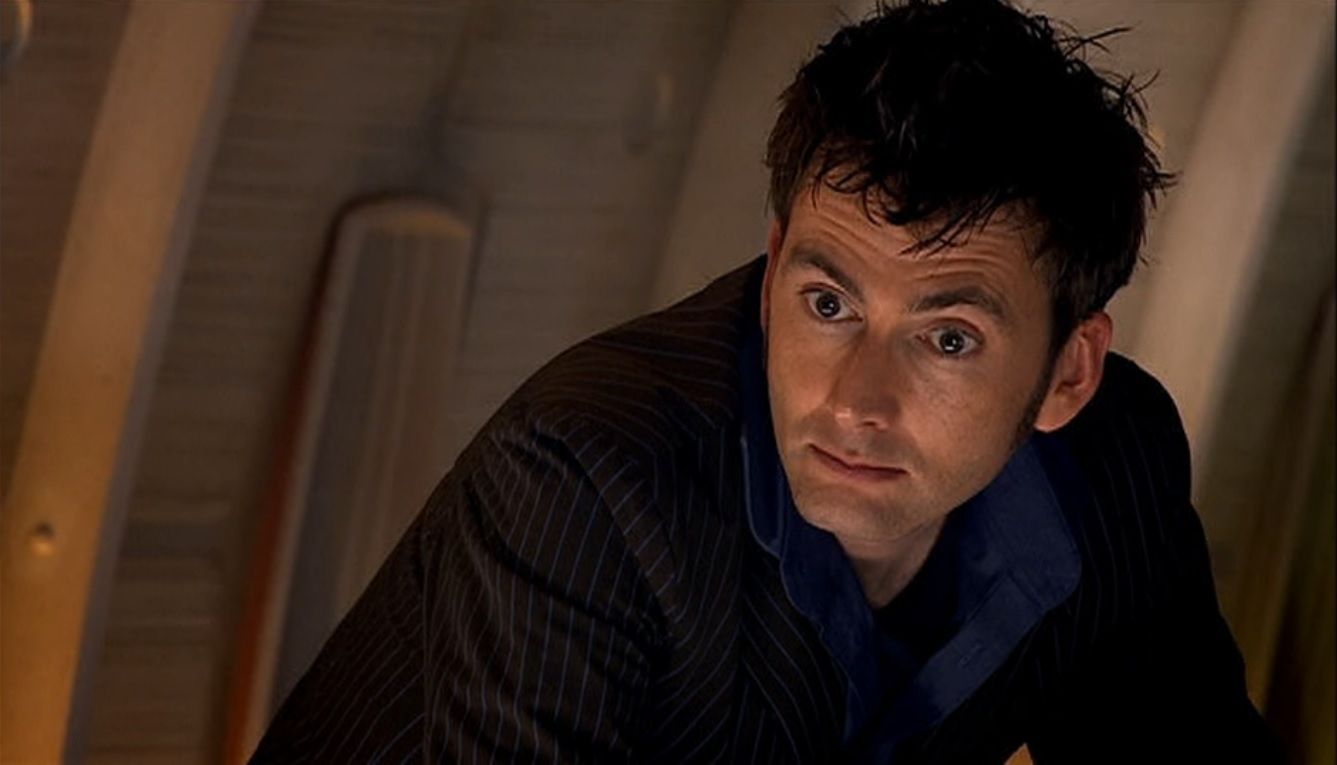
Written By Russell T. Davies and directed by Alice Troughton
The Doctor is on the leisure planet of “Midnight,” a stunning planet covered in diamonds but deadly due to having no atmosphere and an incredibly toxic surface. The Time Lord takes a bus journey to see the beautiful sapphire waterfall, traveling with a group of strangers. But an entity attacks the vessel, breaking it and infiltrating its passengers. With no idea who the entity has taken hold of, no one on the bus can be trusted. Not even the Doctor.
“Midnight” is mostly set in one tiny, cramped set. With no visible enemy, the horror comes from the passengers themselves and their distrust of each other. The tension within the episode never lifts; there are no jump scares to provide relief. Instead, the arguments get louder, and the characters get more frantic. The way that the villain occupies a person and transfers itself is unsettling and uncomfortable, laid out through a skin-crawling script by Davies.
David Tennant shows off just how much range he has as an actor. At the beginning of the episode, he’s jovial and friendly, what his version of the Doctor is known for. But as the sanity of the fellow passengers, and his own, starts to slip, the audience sees a raw, vulnerable side of their hero that is rarely available to them. Opposite him, Lesley Sharp commands all the attention. Her facial expressions and tone of voice are more frightening than any monster that has come before or after this episode.
Acting, sound design, plot, frights, and dialogue. “Midnight” is a shining example of them all.
If you liked this episode, here are some other Doctor Who episodes starring David Tennant to check out: “Blink,” “The Waters of Mars,” “The End of Time,” and “The Girl in the Fireplace.
Eleventh Doctor (Matt Smith): Vincent and the Doctor

Written by Richard Curtis and directed by Jonny Campbell
After spotting a monster inside a classic painting, the Doctor and Amy travel to 1890s France. Concerned that the alien may harm the painter, they encounter the greatest artist of them all: Vincent Van Gogh. Vincent helps the visitors battle their foe. The Doctor and Amy also witness the beautiful but tragic mind Vincent was plagued with, as they cross paths with him just months before his suicide.
“Vincent and the Doctor” is a strange episode because much of it isn’t very good. The alien antagonist is mostly forgettable and uninspiring, with action that isn’t exciting at all. But this episode makes up for it with its last third alone. The sub-plot of Amy and the Doctor engaging with Vincent makes it special, as a very brilliant but unstable character is investigated. The dialogue is a concoction of hope, despair, and love towards one of the most devastating figures in history. Curtis treats the incredibly dark subject matter with such tenderness and sensitivity whilst also being raw and uncomfortable when needed.
Van Gogh, played excellently by Tony Curran, drives the audience to tears with his performance. He portrays a man wracked with anguish and pain in a way that leaves the audience silenced. Within the last scene, Bill Nighy delivers a gorgeous monologue framed around Curran’s face, drenched in shock and tears, resulting in what may be the most emotional scene in Doctor Who history.
“Vincent and the Doctor” is grown-up, dark, and a love letter to a genius.
If you liked this episode, here are some other Doctor Who episodes starring Matt Smith to check out: “Amy’s Choice,” “Eleventh Hour,” “A Good Man Goes to War,” and “The Angels Take Manhattan.”
War Doctor (John Hurt): Day of the Doctor
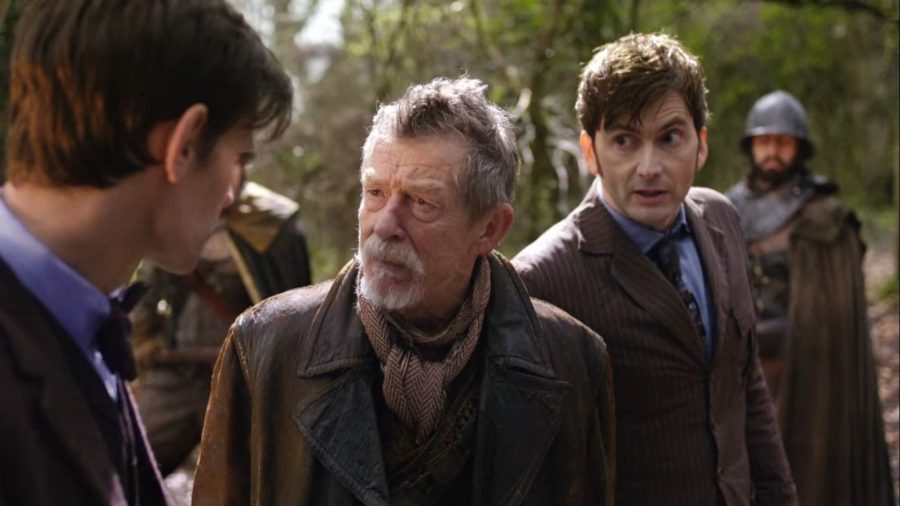
Written by Steven Moffat and directed by Nick Hurran
With the 50th Anniversary episode of Doctor Who, three Doctors are brought together to defeat the Zygons, a shapeshifting race of aliens, who have landed in Elizabethan England. And the end of the Time War, hidden in secret and shame for years, is revealed.
A record-breaking, momentous episode, the “Day of the Doctor” actually has a forgetful plot. The Zygons and their plans aren’t interesting. What is interesting is the conclusion of a mystery that began with the first episode of the Doctor Who revival in 2005. The Time War was a gigantic conflict that took place before the Ninth Doctor, in which the Time Lords were wiped out bar a couple of stragglers. One of them, our favourite Time Lord, was the one who pulled the trigger, ending the war in the process. Within this episode, the audience finds out the truth.
This episode has jaw-dropping effects, sound design, and direction, shot in stereoscopic 3D. Due to the enormity of the occasion, it was broadcast around the globe at the same time and had a brief distribution within theatres.
But what is truly special is the interaction between the Doctors. David Tennant and Matt Smith’s incarnations of the character have been seen in abundance on screen, and their clashes between each other are hilarious and emotional. But the anniversary episode also properly introduced a hidden regeneration: the War Doctor. Living between the Eighth and Ninth iterations, the War Doctor served in the Time War, his actions within that conflict forcing his future selves to erase him entirely from their past.
The late, great John Hurt brings his signature gravelly voice and image to the role, giving his version of the Doctor a mixture of anger and exhaustion. Featuring all three Doctors within the same episode shows the differences in their personalities, how they have changed, and the affectations each actor has brought to their persona.
John Hurt only appeared in one full episode of Doctor Who. Oh, how I wish there were more.
Twelfth Doctor (Peter Capaldi): Listen

Written by Steven Moffat and directed by Douglas Mackinnon
The Doctor summons his companion Clara to the TARDIS after he finds the word “Listen” on a chalkboard. In his handwriting, no less. He delivers a hypothesis: what if there was an entity, a monster, that was always around you but is always hiding? The Doctor and Clara journey into their own past and future to discover a question in the minds of every being in the universe: is there something under the bed?
“Listen” is a strange but scary episode, with similarities to “Midnight.” It is never clear what the monster is, either hidden under bedsheets or outside of airlocks. And yet, the potential scare and constant tension keep the audience’s heart moving at a canter. The episode taps into a fear that every person has felt at some point, that something is behind them. The plot is slow with a bizarre structure before it all makes sense at the very end. Doctor Who has always brilliantly taken your childhood fears and made them real.
Capaldi as the Doctor is eccentric and often hard to decipher. He moves too fast for humans, often forgetting about them. But this episode reveals a fear within him that he has felt for thousands of years. “Listen” shows a side of the Doctor never seen before, revealing more of his cryptic backstory.
Capaldi’s most noticeable feature in the role was his ability to recite exceptional monologues. Give him a speech, and the audience will be hanging from his every word. His delivery as an actor is astonishing. When he speaks, you listen.
If you liked this episode, here are some other Doctor Who episodes starring Peter Capaldi to check out: “Twice Upon a Time” and “Heaven Sent.”
Thirteenth Doctor (Jodie Whittaker): Rosa
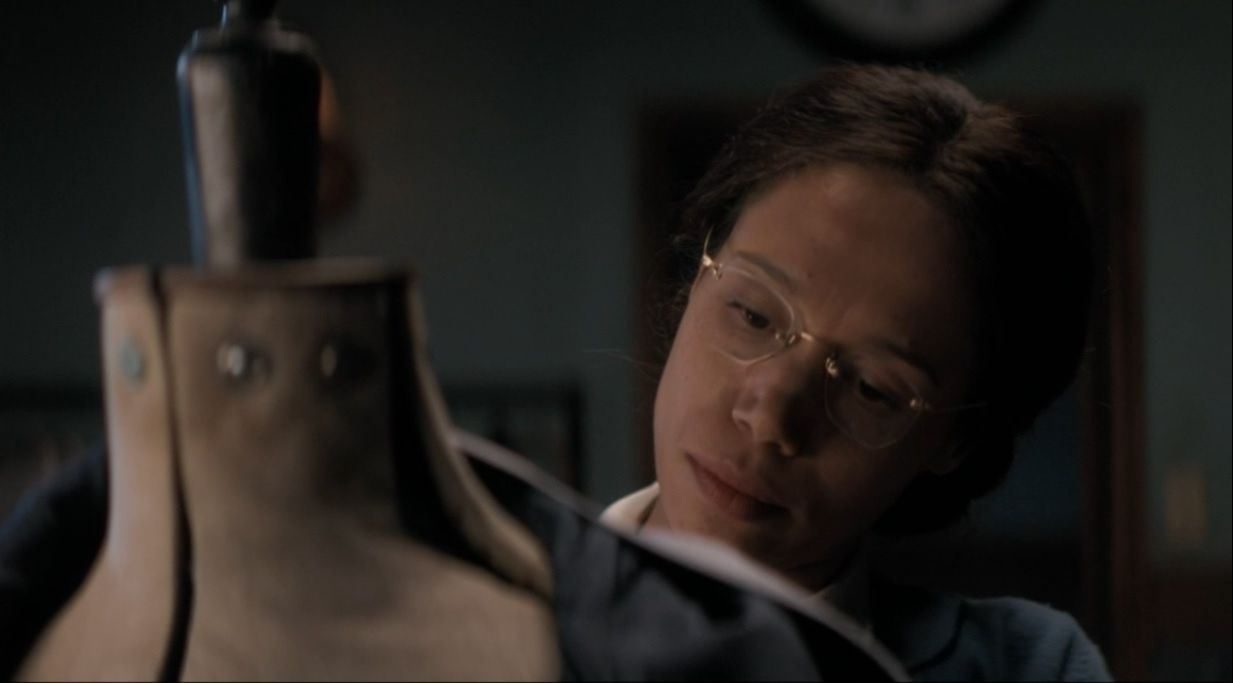
Written by Malorie Blackman and Chris Chibnall and directed by Mark Tonderai
The Doctor and her team journey to Montgomery, Alabama, in 1955. There they meet Rosa Parks, a seamstress and activist. The Doctor has always been firm in the ruling that fixed points in time must never be changed. But they may be forced to become part of history when a man from the future seeks to stop Rosa from getting on a bus.
This episode revolves around a subject matter that is heavy but is a crucial moment of history. The series’s sci-fi elements take a back seat within “Rosa,” allowing a more historical story to be told. Blackman and Chibnall tackle the plot and dialogue with sincerity and honesty, penning a very investing script. The episode’s villain is secondary to the horror that was actually experienced daily by black people at the time. The facts and names within the episode are all accurate, down to the bus driver’s name and the number of stops the vehicle traveled before the driver challenged Parks.
Whittaker is groundbreaking as the Doctor, being the first woman to gain the keys to the TARDIS. She shows her kindness at multiple points in this episode and her extreme hatred for bullies. Her personality is usually more positive, but the tone of the episode is tempered slightly. One of her companions, Ryan Sinclair (Tosin Cole), provides a brilliant performance. He acts as the audience’s representative; he is there to ask questions that develop exposition. His own experiences, a black man living in modern-day England, allows for comparisons between then and now.
Vinnette Robinson is astonishing as Parks, depicting more than a fraction of her strength and resolve. The voice, accent, and hair are all considered with great detail.
When Doctor Who was first created, it was intended to be educational. “Rosa” does that in a beautifully acted, directed, and written way.
If you liked this episode, here are some other Doctor Who episodes starring Jodie Whittaker to check out: “Demons of Punjab” and “Kablam!”
Doctor Who as a series is constantly changing. Each episode is different from the last: different worlds, different times, different casts. Every actor that has captained that blue box has brought a unique identity to the Time Lord. These Doctor Who episodes are just a small sample size of what the series has to offer, but they adequately encapsulate the show’s soul.
Doctor Who can be watched on HBO Max, Netflix, and BBC iPlayer (British audiences only)



